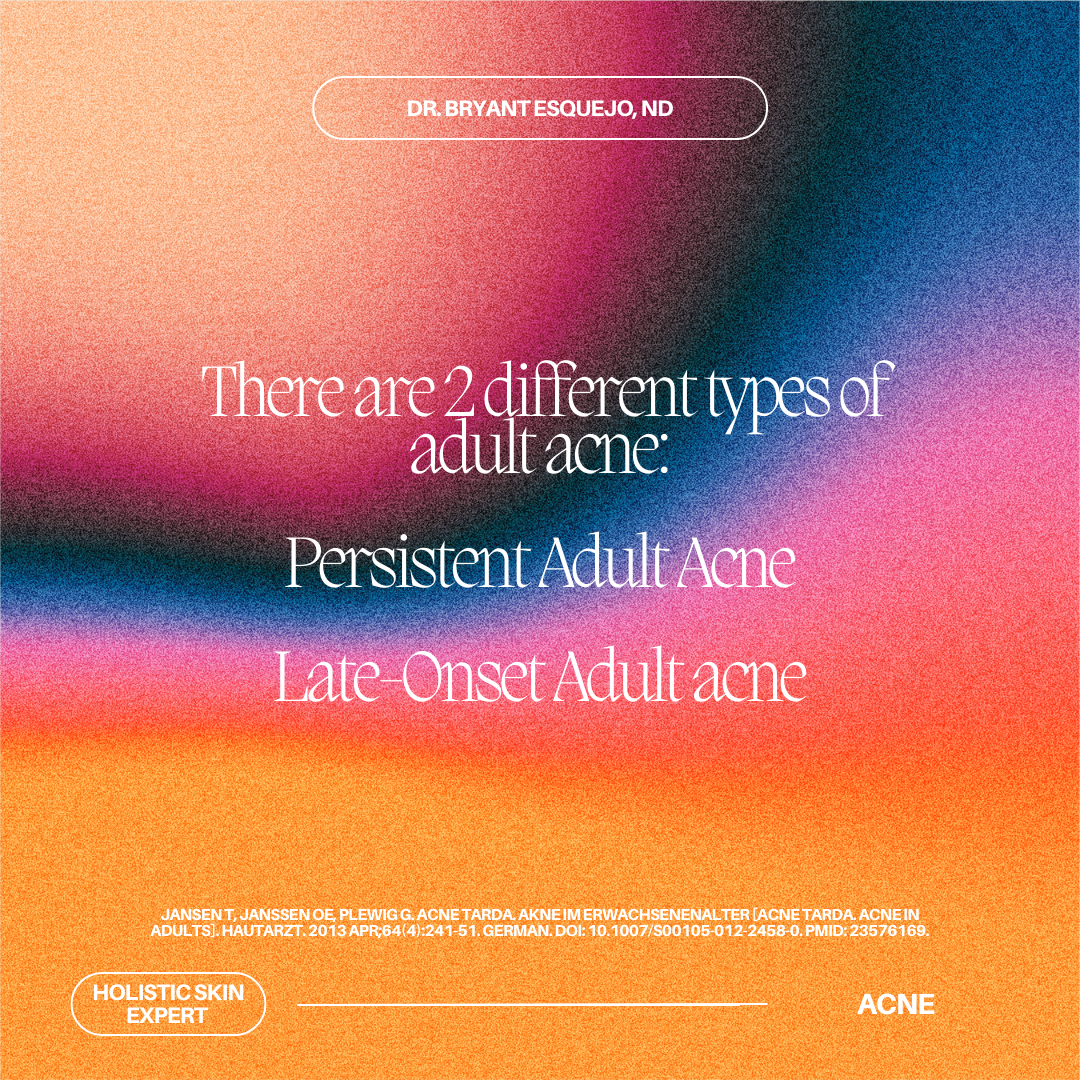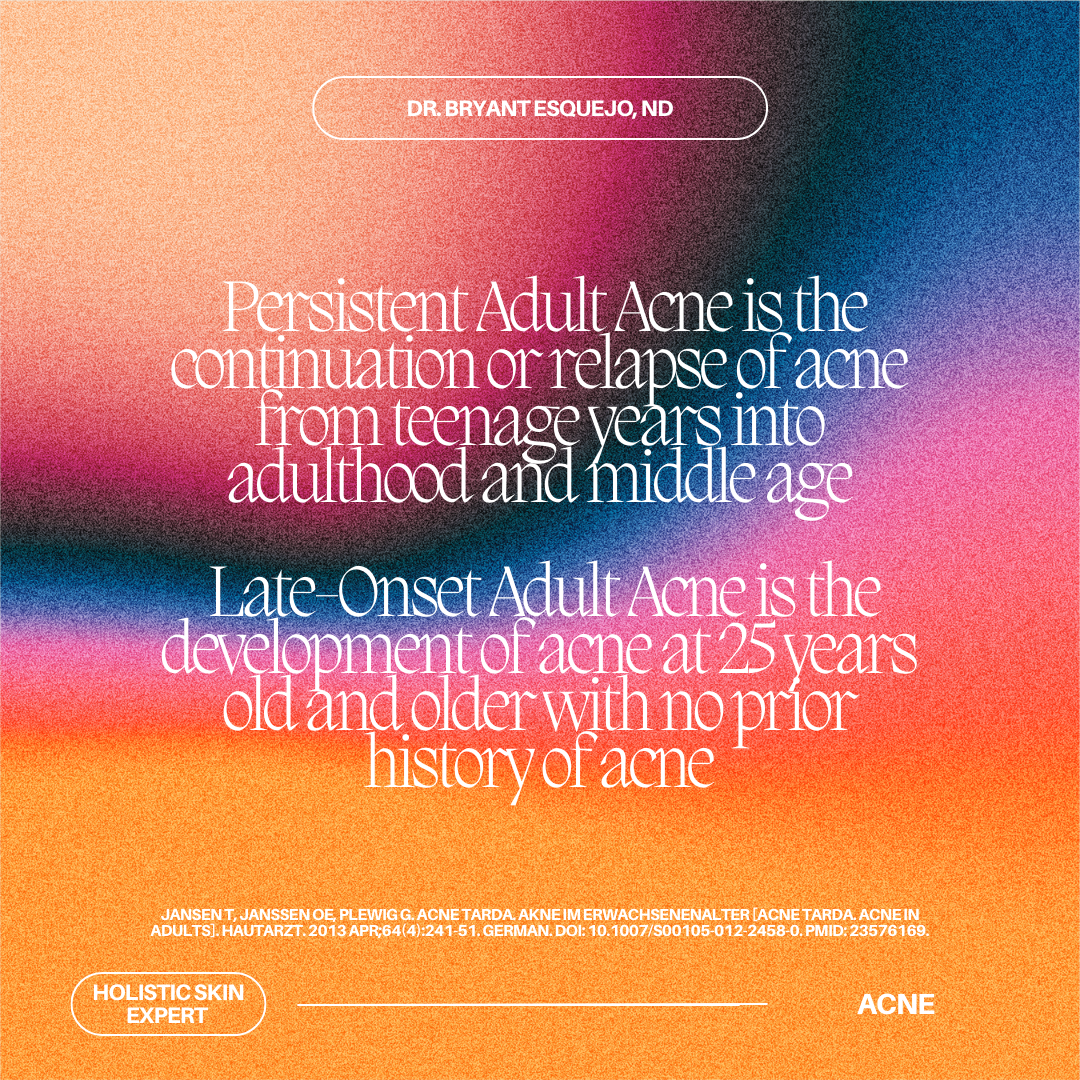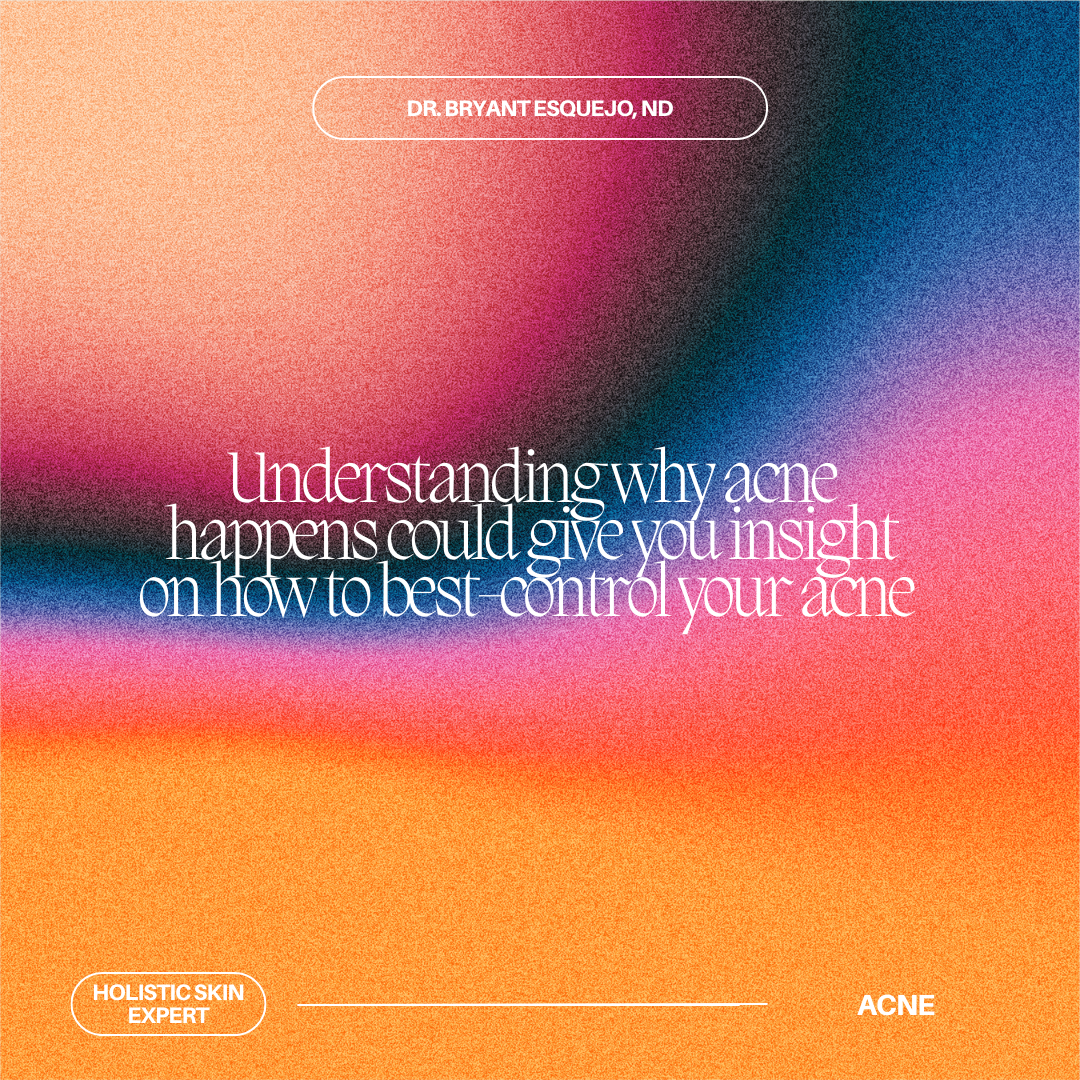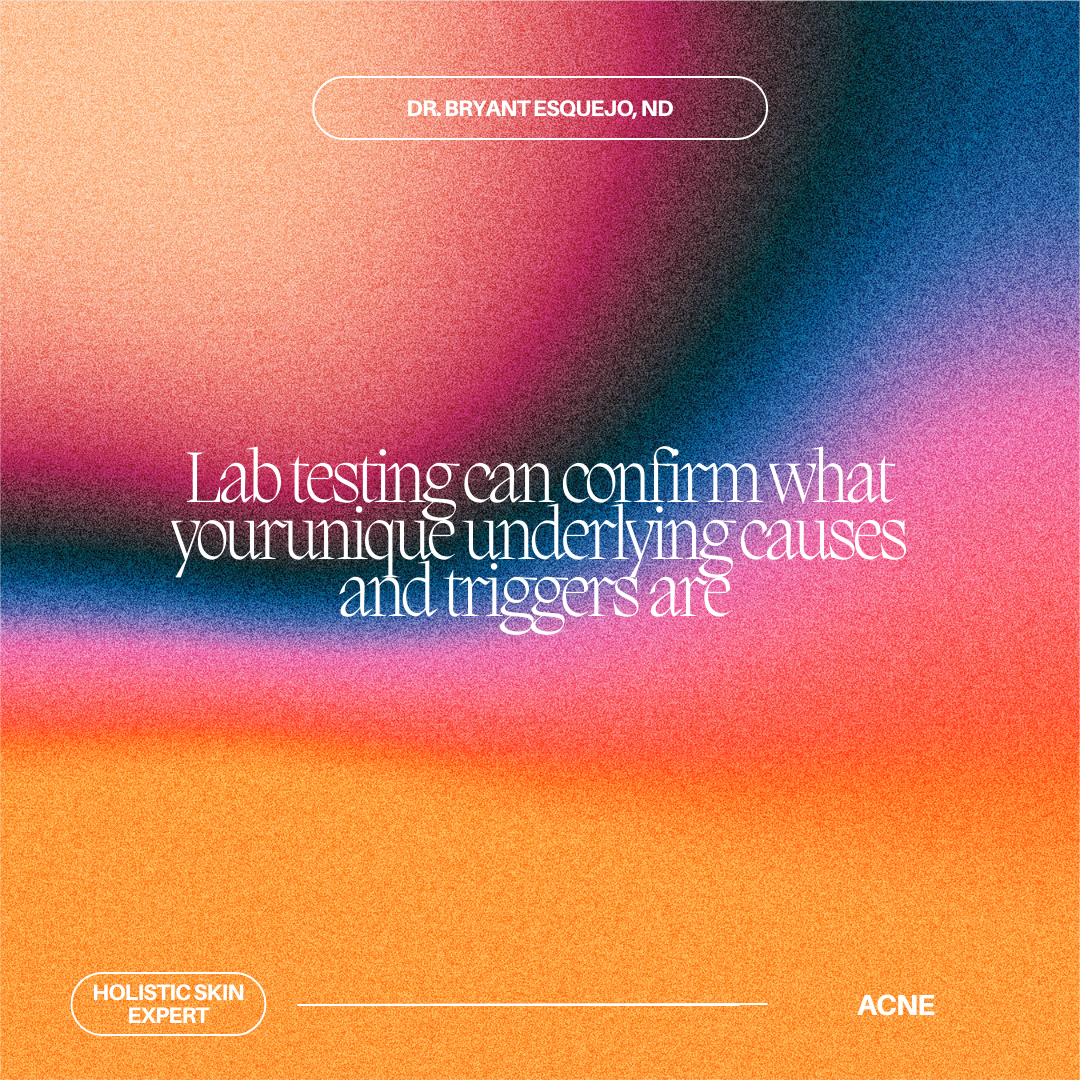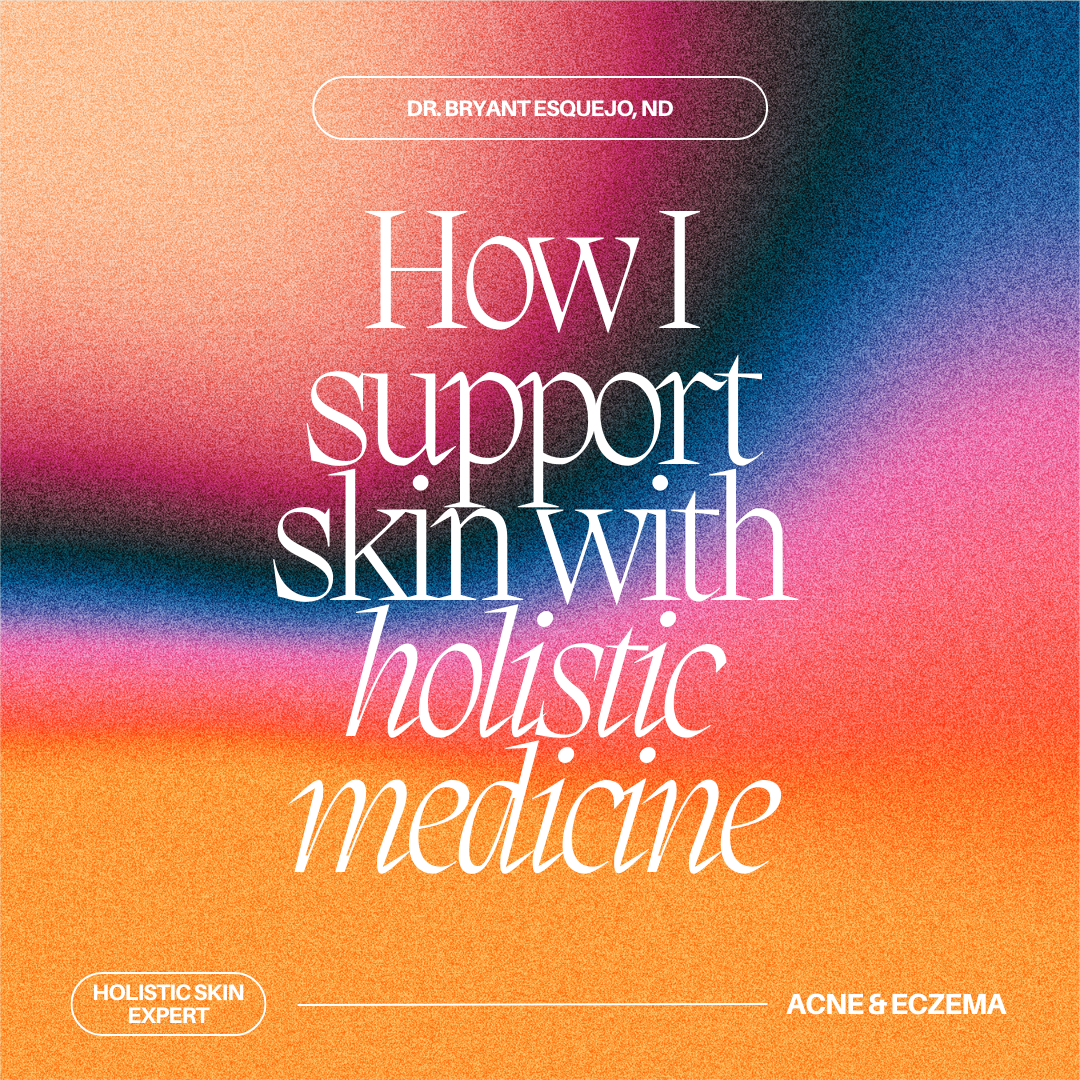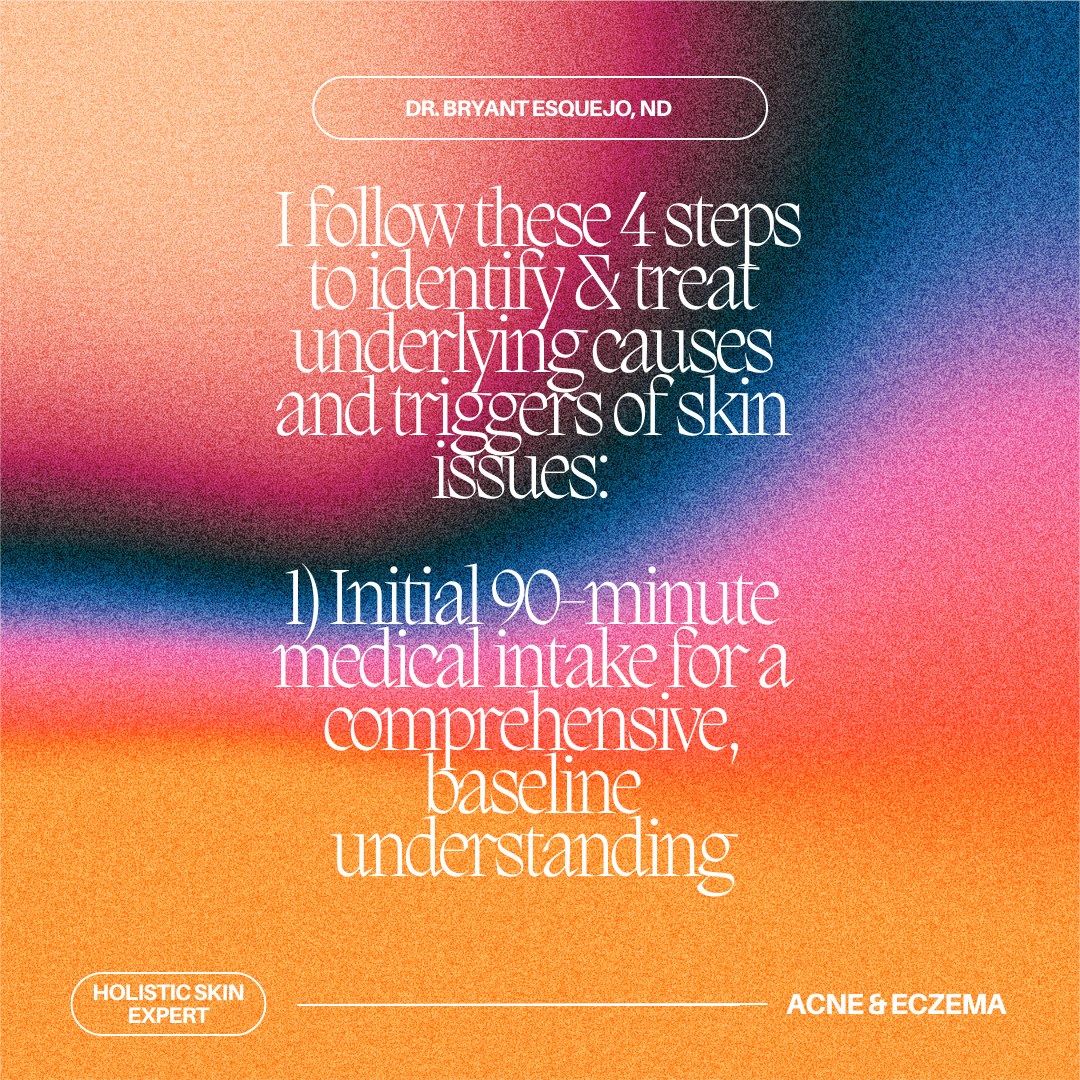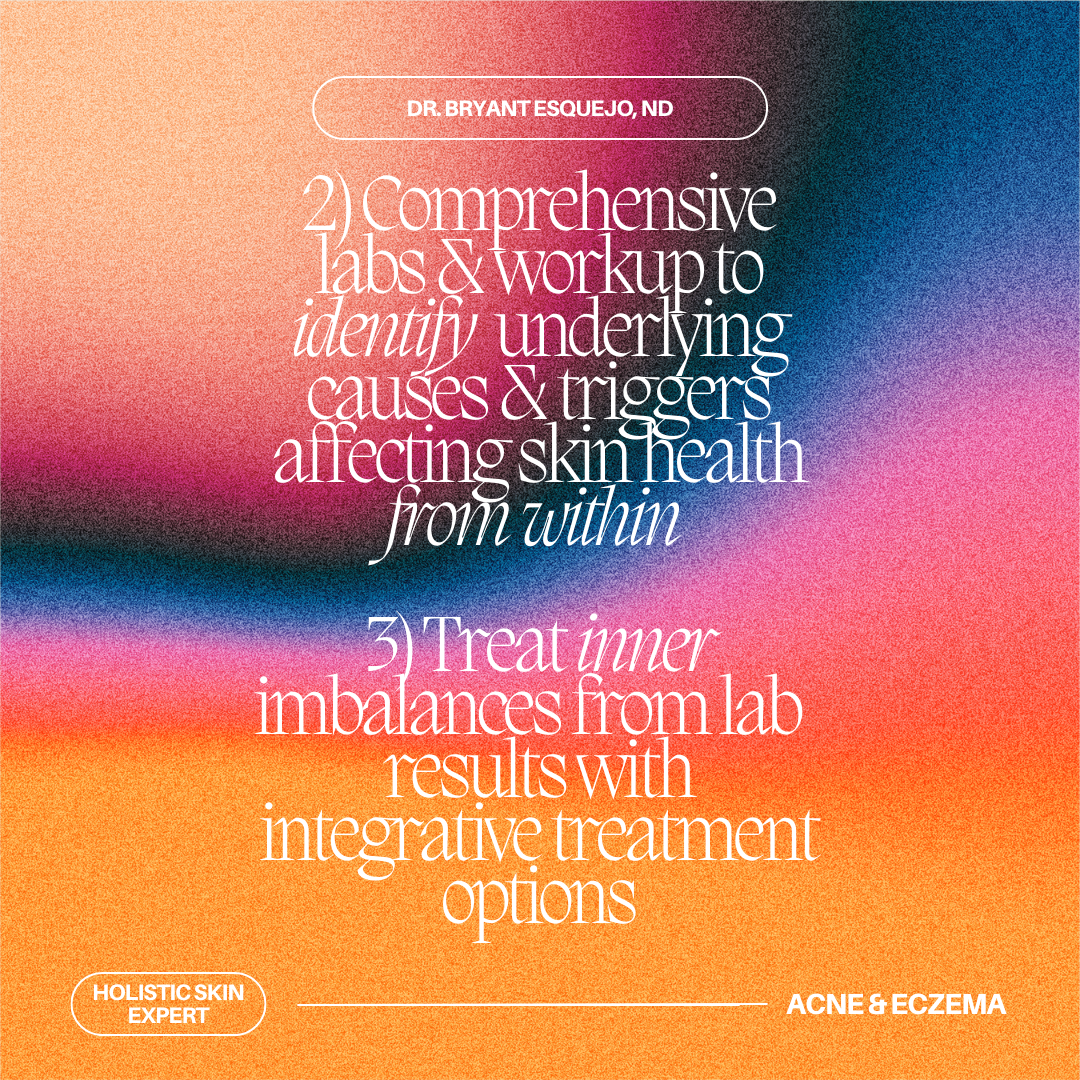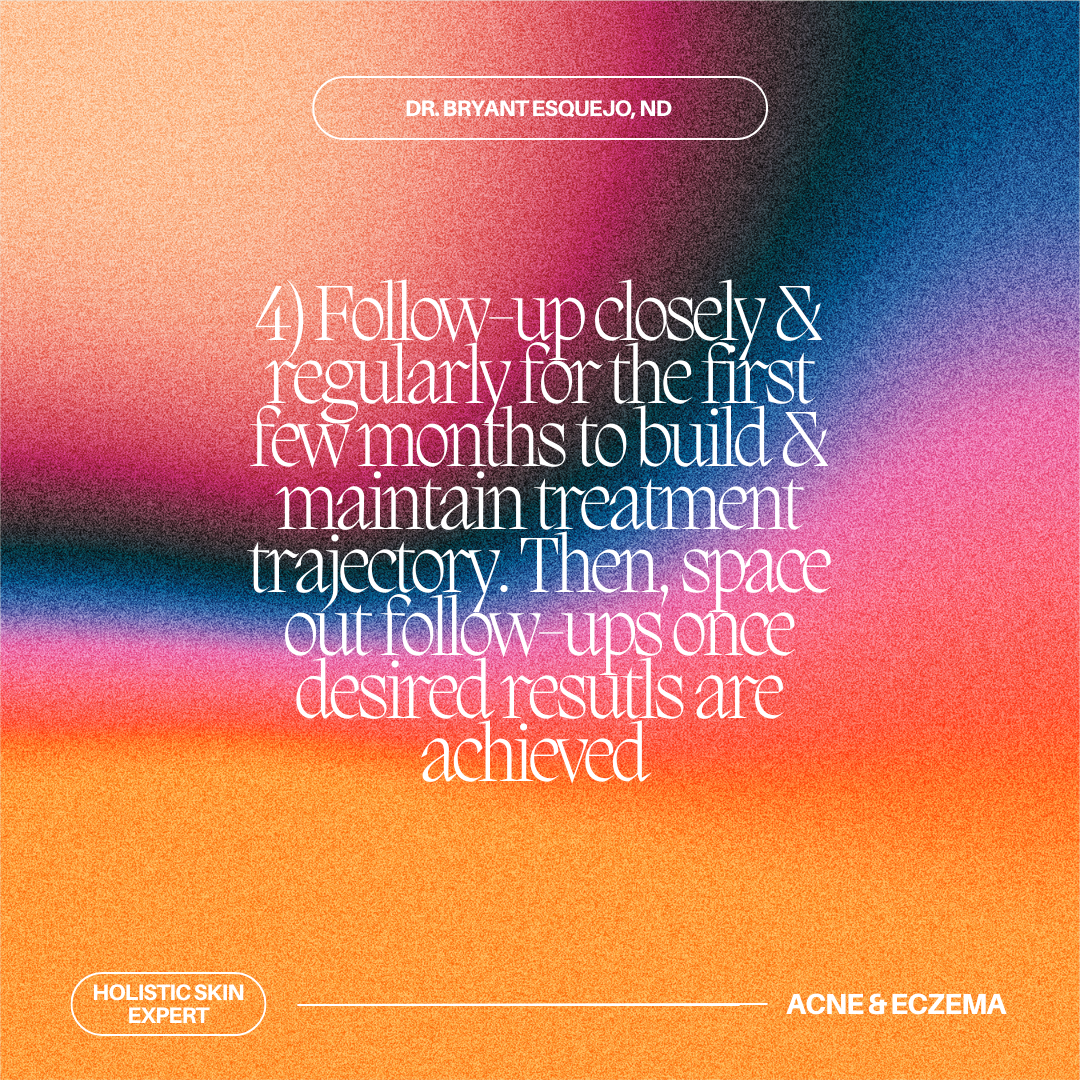What you need to know about ADULT ACNE
adult acne is common, and this is how it can be addressed naturopathically
This blog post is for you if you have been experiencing adult acne, and want to achieve healthier and clearer skin holistically & integrative-ly.
As a licensed naturopathic doctor whose expertise is in holistic acne treatment, I strongly believe that skin health is a reflection of inner health. And, according to literature, there are several inner factors that can contribute to adult acne!
From what I’ve seen with my adult acne patients (and with myself), identifying and treating someone’s unique root causes and triggers helps them start to achieve healthier and clearer skin.
So, in this blog post, we will chat about the different types of adult acne, what causes acne, how labs can help identify & confirm causes and triggers, and how these underlying root issues can be treated from a naturopathic point-of-view.
DISCLAIMER: THESE STATEMENTS HAVE NOT BEEN EVALUATED BY THE FOOD AND DRUG ADMINISTRATION. THIS POST DOES NOT CONSTITUTE AS MEDICAL ADVICE; IS NOT MEANT TO DIAGNOSE, PREVENT, TREAT, OR CURE ANY CONDITIONS OR DISEASE; AND IS MEANT FOR EDUCATIONAL PURPOSES ONLY. THE INFORMATION IN THIS POST DOES NOT REPLACE OR SUBSTITUTE THE ADVICE OF YOUR MEDICAL PROVIDER. SPEAK TO YOUR DOCTOR BEFORE STARTING ANY NEW TREATMENTS OR SUPPLEMENTS OR BOOK YOUR APPOINTMENT WITH ME TODAY.
Different types of adult acne
Yup, there are different types of adult acne
Acne in adults is called Acne tarda, and there are 2 different types: Persistent Adult Acne and Late-Onset Adult Acne.
Persistent Adult Acne is the continuation or relapse of acne from teenage years into adulthood and middle age, and Late-Onset Adult Acne is the development of acne at 25 years old and older with no prior history of acne.
According to science, Persistent Adult Acne is more common and that adult acne is more common in women than in men!
Science also shows that adult female acne is on the rise! According to researchers, 12-22% of females will get adult acne in their lifetime, and that acne persists in 41% of adult females.
Why do people get acne?
When talking about why acne happens, you can look at acne on the skin level and looking at deeper issues affecting skin health.
When looking at acne on the skin level, science says that 4 elements are necessary:
Excess oil production
Keratin plug formation
Bacteria
Bacteria-caused inflammation
Skin health is more than skin deep
When looking at deeper causes, science tells us that hormones and inflammation may be playing roles.
When looking at hormones, science shows that androgen hormones contribute to the cascade that triggers acne on the skin level.
Some examples of androgens are DHEA, testosterone, and di-hydro testosterone (DHT).
But, what causes higher levels of these acne-causing androgen hormones?
Well, diet, stress, polycystic ovarian syndrome (PCOS), insulin resistance, and more can cause higher levels of androgen hormones!
Inflammation & adult acne
When looking at inner inflammation, science shows that nutrient deficiencies and gut health may be contributing to inflammation linked to acne.
According to literature, peeople with acne are likely to experience vitamin D deficiency. And scientists suggest that vitamin D is an essential nutrient for healthy inflammatory response!
Now, researchers of a 2016 study showed that when vitamin D supplements were given to subjects with both acne AND vitamin D deficiency, their acne got better!
Gut health & adult acne
Moving onto gut health, science shows that people with acne are more likely to experience gut bacteria imbalance (aka dysbiosis) and that acne is linked to irritable bowel syndrome (IBS).
IBS is commonly diagnosed nowadays, and it can look like gas, bloat, and changes to bowel movements. And, according to science, gut dysbiosis might also contribute to these symptoms!
So, looking at gut bacteria balance might be worthwhile in people with both acne, gut issues, and IBS! (Click here to learn more about IBS & skin health)
Labs for adult acne
When I want to identify what my patients inner acne root issues are, I want to do some labs and work-up. As noted earlier, there are many factors that can cause and trigger acne, such as hormones and different forms of inflammation.
When wanting to look at acne-causing hormone imbalance and the possible underlying root issues contributing to hormone imbalance, there are several labs that your doctor can order.
Acne-causing androgens that your doctor can test for include DHEA-S and testosterone.
If your doctor suspects that you have PCOS, your doctor may want to do other labs to rule-in PCOS and rule out conditions that look like PCOS (since PCOS is considered a diagnosis of exclusion - click here to learn more about PCOS).
When looking at inflammation, your doctor may order vitamin D levels if they suspect that it is contributing to acne-linked inflammation.
When looking at gut health, I want to check gut-specific inflammation and gut bacteria populations.
To check gut-specific inflammation and gut bacteria balance, I like to order Diagnostic Solutions’ GI-Map stool analysis.
Learn more about the GI-Map stool test:
Holistic & integrative options for adult acne
What does HOLISTIC mean?
Holistic acne treatment involves topical solutions and inner health solutions to achieve healthier skin from a 360° point-of-view. And, addressing the inner root issues IS holistic medicine.
What does integrative mean?
As an integrative medicine expert, that means I am trained in both natural and conventional options. Understanding how different options work help me present a vast number of solutions to my patients that they can choose from, depending on what their goals and preferences are.
When looking at topical and inner solutions, there are both conventional and natural options. I’m sure a lot of you already know what these conventional options look like, and are here for information on natural and holistic skin solutions.
So, let’s dive into what these natural and holistic options look like when you see your licensed Naturopathic Doctor.
Natural, holistic skin options
When looking at the skin level, there are some basic tenants that providers commonly recommend to their patients, such as length of cleansing, being intentional about the actives they use, and using the right actives during the right time of day.
Diet & acne
When looking at diet, the foods we commonly eat can trigger androgen hormone imbalance and also trigger gut bacteria imbalance.
When looking at the science, literature tells us that excess consumption of simple carbohydrates tells the body to produce more insulin, and insulin then tells the body to produce androgen hormones.
Additionally, whey protein from dairy tells the body to produce insulin-like growth factor-1, which also tells the body to produce androgen hormones.
Science also tells us that high fat, low fiber diets can trigger gut bacteria imbalance. And, science shows that eating 30 different plants a week could support healthier and more-diverse gut bacteria populations.
Exercise & skin support
When looking at exercise, science tells us that regular exercise can support insulin sensitivity and blood sugar balance.
Science also shows that exercise may support gut bacteria diversity and balance and support gut-specific anti-inflammatory compounds in the gut.
Additionally, research completed on people with PCOS shows that yoga drove down DHEA androgens in subjects.
While diet, exercise, and lifestyle are the basic foundations of health and wellness, your doctor may recommend some targeted supplements that address the unique causes and triggers playing a role in your acne.
Nutrient repletion & skin support
As noted earlier, vitamin D has been shown to be supportive for people who have both acne and vitamin D deficiency.
Science also shows that zinc is as effective as antibiotics in people who have both acne and zinc deficiency.
Beyond these, there are several nutrients and herbs that may support blood sugar balance, gut bacteria balance, and other root issues linked to acne.
But, what about probiotics?
While there is science showing that probiotics may support skin health, they aren’t the first thing that I go for because of a couple of reasons.
First, probiotics may worsen things. As noted earlier, gut bacteria imbalance is linked to both acne & IBS. One of the root issues contributing to IBS symptoms, is small intestinal bacteria overgrowth (SIBO). And when people with SIBO take probiotics, science shows that they can feel worse!
Secondly, probiotics can be expensive, especially if you want a high-quality one. And, there are other (cost-effective) methods that can support gut bacteria balance, such as being intentional with the foods we regularly eat.
LISTEN TO THE HOLISTIC BEAUTY PODCAST:
DR. MARILYN MEROLA, ND & I chat about how diet & lifestyle play a role in adult acne
what if you want to address your adult acne holistically?
The answer is simple: Work with a licensed naturopathic provider. As mentioned earlier, licensed naturopathic providers are experts in holistic and integrative medicine.
As integrative medicine experts, we are trained in both natural and conventional options. So, you will be able to capture a vast array of treatment options to help you achieve your skin goals when you work with a licensed naturoapthic doctor.
If you want to see me, I see patients in-person and virtually. The only caveat is that since I am only licensed in the state of California, I can only see patients who are physically in the state of California (especially for telehealth patients).
Want to learn about skin health from a holistic & integrative POV? Read these blog posts to learn more::
To stay up-to-date about future articles on my website, click here sure to sign up for my email newsletter. And, if you want to set up an appointment with me, click here.

